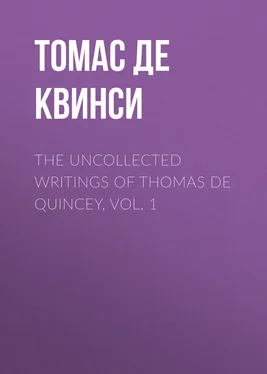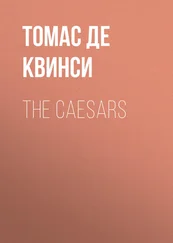Томас Де Квинси - The Uncollected Writings of Thomas de Quincey, Vol. 1
Здесь есть возможность читать онлайн «Томас Де Квинси - The Uncollected Writings of Thomas de Quincey, Vol. 1» — ознакомительный отрывок электронной книги совершенно бесплатно, а после прочтения отрывка купить полную версию. В некоторых случаях можно слушать аудио, скачать через торрент в формате fb2 и присутствует краткое содержание. Жанр: foreign_prose, literature_19, foreign_antique, на английском языке. Описание произведения, (предисловие) а так же отзывы посетителей доступны на портале библиотеки ЛибКат.
- Название:The Uncollected Writings of Thomas de Quincey, Vol. 1
- Автор:
- Жанр:
- Год:неизвестен
- ISBN:нет данных
- Рейтинг книги:4 / 5. Голосов: 1
-
Избранное:Добавить в избранное
- Отзывы:
-
Ваша оценка:
- 80
- 1
- 2
- 3
- 4
- 5
The Uncollected Writings of Thomas de Quincey, Vol. 1: краткое содержание, описание и аннотация
Предлагаем к чтению аннотацию, описание, краткое содержание или предисловие (зависит от того, что написал сам автор книги «The Uncollected Writings of Thomas de Quincey, Vol. 1»). Если вы не нашли необходимую информацию о книге — напишите в комментариях, мы постараемся отыскать её.
The Uncollected Writings of Thomas de Quincey, Vol. 1 — читать онлайн ознакомительный отрывок
Ниже представлен текст книги, разбитый по страницам. Система сохранения места последней прочитанной страницы, позволяет с удобством читать онлайн бесплатно книгу «The Uncollected Writings of Thomas de Quincey, Vol. 1», без необходимости каждый раз заново искать на чём Вы остановились. Поставьте закладку, и сможете в любой момент перейти на страницу, на которой закончили чтение.
Интервал:
Закладка:
Between Chaucer and Homer—as to the main art of narration, as to the picturesque life of the manners, and as to the exquisite delineation of character—the interval is as wide as between Shakespeare, in dramatic power, and Nic. Rowe.
And we might wind up this main chapter, of the comparison between Grecian and English literature—viz. the chapter on Homer, by this tight dilemma. You do or you do not use the Longinian word ὑψος in the modern sense of the sublime. If you do not, then of course you translate it in the Grecian sense, as explained above; and in that sense, we engage to produce many scores of passages from Chaucer, not exceeding 50 to 80 lines, which contain more of picturesque simplicity, more tenderness, more fidelity to nature, more felicity of sentiment, more animation of narrative, and more truth of character, than can be matched in all the Iliad or the Odyssey . On the other hand, if by ὑψος you choose absurdly to mean sublimity in the modern sense, then it will suffice for us that we challenge you to the production of one instance which truly and incontestably embodies that quality. 11 11 The description of Apollo in wrath as νυκτι εοικω, like night, is a doubtful case. With respect to the shield of Achilles, it cannot be denied that the general conception has, in common with all abstractions (as e. g. the abstractions of dreams, of prophetic visions, such as that in the 6th Æneid, that to Macbeth, that shown by the angel Michael to Adam), something fine and, in its own nature, let the execution be what it may, sublime. But this part of the Iliad , we firmly believe to be an interpolation of times long posterior to that of Homer.
The burthen of proof rests upon you who affirm, not upon us who deny. Meantime, as a kind of choke-pear, we leave with the Homeric adorer this one brace of portraits, or hints for such a brace, which we commend to his comparison, as Hamlet did the portraits of the two brothers to his besotted mother. We are talking of the sublime: that is our thesis. Now observe: there is a catalogue in the Iliad —there is a catalogue in the Paradise Lost . And, like a river of Macedon and of Monmouth, the two catalogues agree in that one fact—viz. that they are such. But as to the rest, we are willing to abide by the issue of that one comparison, left to the very dullest sensibility, for the decision of the total question at issue. And what is that? Not, Heaven preserve us! as to the comparative claims of Milton and Homer in this point of sublimity—for surely it would be absurd to compare him who has most with him whom we affirm to have none at all—but whether Homer has the very smallest pretensions in that point. The result, as we state it, is this:—The catalogue of the ruined angels in Milton, is, in itself taken separately, a perfect poem, with the beauty, and the felicity, and the glory of a dream. The Homeric catalogue of ships is exactly on a level with the muster-roll of a regiment, the register of a tax-gatherer, the catalogue of an auctioneer. Nay, some catalogues are far more interesting, and more alive with meaning. 'But him followed fifty black ships!'—'But him follow seventy black ships!' Faugh! We could make a more readable poem out of an Insolvent's Balance Sheet.
One other little suggestion we could wish to offer. Those who would contend against the vast superiority of Chaucer (and him we mention chiefly because he really has in excess those very qualities of life, motion, and picturesque simplicity, to which the Homeric characteristics chiefly tend), ought to bear in mind one startling fact evidently at war with the degree of what is claimed for Homer. It is this: Chaucer is carried naturally by the very course of his tales into the heart of domestic life, and of the scenery most favourable to the movements of human sensibility. Homer, on the other hand, is kept out of that sphere, and is imprisoned in the monotonies of a camp or a battle-field, equally by the necessities of his story, and by the proprieties of Grecian life (which in fact are pretty nearly those of Turkish life at this day). Men and women meet only under rare, hurried, and exclusive circumstances. Hence it is, that throughout the entire Iliad , we have but one scene in which the finest affections of the human heart can find an opening for display; of course, everybody knows at once that we are speaking of the scene between Hector, Andromache, and the young Astyanax. No need for question here; it is Hobson's choice in Greek literature, when you are seeking for the poetry of human sensibilities. One such scene there is, and no more; which, of itself, is some reason for suspecting its authenticity. And, by the way, at this point, it is worth while remarking, that a late excellent critic always pronounced the words applied to Andromache δακρυοεν γελασασα ( tearfully smiling , or, smiling through her tears ), a mere Alexandrian interpolation. And why? Now mark the reason. Was it because the circumstance is in itself vicious, or out of nature? Not at all: nothing more probable or more interesting under the general situation of peril combined with the little incident of the infant's alarm at the plumed helmet. But any just taste feels it to be out of the Homeric key; the barbarism of the age, not mitigated (as in Chaucer's far less barbarous age) by the tenderness of Christian sentiment, turned a deaf ear and a repulsive aspect to such beautiful traits of domestic feeling; to Homer himself the whole circumstance would have been one of pure effeminacy. Now, we recommend it to the reader's reflection—and let him weigh well the condition under which that poetry moves that cannot indulge a tender sentiment without being justly suspected of adulterous commerce with some after age. This remark, however, is by the by; having grown out of the δακρυοεν γελασασα, itself a digression. But, returning from that to our previous theme, we desire every candid reader to ask himself what must be the character, what the circumscription, of that poetry which is limited, by its very subject, 12 12 But the Odyssey , at least, it will be said, is not thus limited: no, not by its subject; because it carries us amongst cities and princes in a state of peace; but it is equally limited by the spirit of manners; we are never admitted amongst women, except by accident (Nausicaa)—by necessity (Penelope)—or by romance (Circe).
to a scene of such intense uniformity as a battle or a camp; and by the prevailing spirit of manners to the exclusive society of men. To make bricks without straw, was the excess even of Egyptian bondage; Homer could not fight up against the necessities of his age, and the defects of its manners. And the very apologies which will be urged for him, drawn as they must be from the spirit of manners prevalent in his era, are reciprocally but so many reasons for not seeking in him the kind of poetry which has been ascribed to him by ignorance, or by defective sensibility, or by the mere self-interest of pedantry.
From Homer, the route stretches thus:—The Grecian drama lies about six hundred years nearer to the Christian era, and Pindar lies in the interval. These— i. e. the Dramatic and Lyric—are the important chapters of the Greek poetry; for as to Pastoral poetry, having only Theocritus surviving, and a very little of Bion and Moschus, and of these one only being of the least separate importance—we cannot hold that department entitled to any notice in so cursory a review of the literature, else we have much to say on this also. Besides that, Theocritus was not a natural poet, indigenous to Sicily, but an artificial blue-stocking; as was Callimachus in a different class.
The drama we may place loosely in the generation next before that of Alexander the Great. And his era may be best remembered by noting it as 333 years B. C. Add thirty years to this era—that will be the era of the Drama. Add a little more than a century, and that will be the era of Pindar. Him, therefore, we will notice first.
Читать дальшеИнтервал:
Закладка:
Похожие книги на «The Uncollected Writings of Thomas de Quincey, Vol. 1»
Представляем Вашему вниманию похожие книги на «The Uncollected Writings of Thomas de Quincey, Vol. 1» списком для выбора. Мы отобрали схожую по названию и смыслу литературу в надежде предоставить читателям больше вариантов отыскать новые, интересные, ещё непрочитанные произведения.
Обсуждение, отзывы о книге «The Uncollected Writings of Thomas de Quincey, Vol. 1» и просто собственные мнения читателей. Оставьте ваши комментарии, напишите, что Вы думаете о произведении, его смысле или главных героях. Укажите что конкретно понравилось, а что нет, и почему Вы так считаете.












